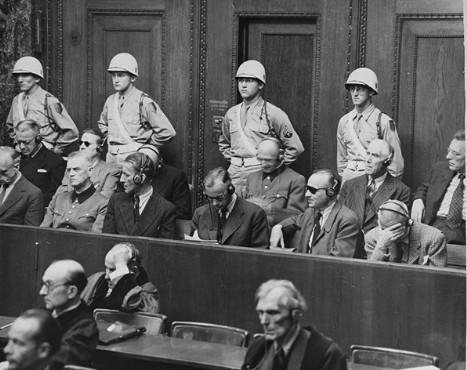A review of “Soviet Judgment at Nuremberg: A New History of the International Military Tribunal after World War II” by Francine Hirsch
Professor Francine Hirsch of The University of Wisconsin-Madison published Soviet Judgment at Nuremberg in July of 2020 through the Oxford University Press.
Defendants at the Nuremberg International Military Tribunal listen to translations. Photo: Wikimedia Commons.
By: Conor J. Regan, Staffer
Exalted as the “greatest trial in history,” the International Military Tribunal (IMT) at Nuremberg, Germany, has long held a foundational place in international criminal law, and become a byword for the promise and moment of transnational criminal prosecution. In the collective American imagination, Nuremberg conjures images of an authoritative Justice Jackson confronting the depraved Hermann Goring with the enormity of German atrocities; or perhaps evokes a cadre of youthful Allied lawyers working assiduously to deliver a humane trial for a Nazi high command that had long forsaken humanity.
Conspicuously absent from the popular iconography is the Soviet delegation and the intellectual handiwork, obstinacy, and hard-won demands they brought to Nuremberg at Stalin’s behest. In Soviet Judgment at Nuremberg, Francine Hirsch endeavors to fill this lacuna in the scholarly canon and remedy the facile narratives of the prevailing Nuremberg mythology.
Hirsch begins by guiding the reader down the tortuous path to Nuremberg, making note of the integral role that Joseph Stalin and his Soviet compatriots played along the way to ensure that some form of public trial would be held for the vanquished German leaders.
As Hirsch demonstrates, Stalin’s conception of an appropriate legal proceeding was firmly rooted in the infamous Moscow Trials of 1936-1938; the Soviet premier was not interested in an even-handed administration of law so much as putting on a Manichean “show trial,” where Soviet chivalry would be contrasted with fascist degeneracy.
These Soviet expectations for Nuremberg were unceremoniously disabused by the German defense’s revelations of evidence of Soviet responsibility for the Katyn Massacre, the harrowing summary execution of nearly 22,000 Polish soldiers in the spring of 1940. This coup de theatre enraged the Soviets and strained relations with the Western Allies, whom the Soviets held responsible for what they considered an unacceptably permissive approach to the submission of evidence.
Hirsch’s work stands out for its excavation of the Soviet intellectual and legal contributions to the Nuremberg IMT. Aron Trainin, a gifted Soviet lawyer, was responsible for many of the legal innovations at Nuremberg. Trainin “first articulated the concept of a ‘crime against peace’ – describing the planning and waging of an unprovoked war of conquest as a punishable criminal act.” This charge, in addition to a variation on the concept of complicity adapted for the military tribunal, would be cited in a U.S. War Department Memo in January of 1945, and ultimately underpin the Allied prosecution strategy at Nuremberg.
Moreover, Soviet Judgment at Nuremberg deftly situates the Nuremberg Trial in the context of incipient Cold War geopolitics. “As the fate of the defendants hung in the balance,” Hirsch writes, “the postwar order did as well . . . the ideals of human rights would be intertwined with the politics of the Cold War for decades to come.”
At Nuremberg, Soviet lawyers and apparatchiks for the first time faced the withering and prolonged scrutiny of an unbridled international press corps, and struggled to control and later respond to the publication of their own war crimes disclosed in the countercharges of the German defense. As Telford Taylor, an American prosecutor at Nuremberg observed, by the end of the trial “the guilt for Katyn leaned heavily on the Soviet Union.” In Hirsch’s pithy summation, “[t]he Soviet Union had won the war; at Nuremberg it lost the victory.”
While Soviet Judgment at Nuremberg undoubtedly presents a rigorous, meticulously researched work of scholarship, Hirsch occasionally offers sweeping opinions on the unheralded Soviet contributions to Nuremberg that can mislead. At the outset of her work, Hirsch writes that “[a]t a time when British leaders and some American politicians (including Treasury Secretary Henry Morgenthau Jr.) favored the summary execution of Nazi leaders as a simpler and more straightforward approach, the Soviets insisted on the convening of an international tribunal.” True, Morgenthau did famously advocate for severe policies towards the Third Reich, but his views were far from emblematic of the American position. Secretary of War Henry L. Stimson had dutifully advanced the international tribunal, and indeed it was President Roosevelt who unveiled at Yalta a comprehensive proposal for the establishment of the IMT.
Relatedly, Joseph Stalin was hardly a consistent exponent of the view that juridical proceedings were the only appropriate way to mete out justice to the Nazi command. At the Tehran Conference of 1943, the Soviet premier toasted to “the quickest possible justice for all German war criminals . . . I drink to the justice of the firing squad.” Nevertheless, Hirsch diligently records the early and critical Soviet support for a tribunal, an idea admirably conceived of during the “bleakest days of German occupation” in 1942.
In Soviet Judgment at Nuremberg, Professor Francine Hirsch presents a rich, nuanced, and timely work on the full panoply of characters and intrigue at the Nuremberg International Military Tribunal of 1945-1946, expertly documenting the significant role that the Soviet Union played on the world’s stage during those heady eleven months. In addition to its novel contribution to Nuremberg scholarship, Soviet Judgment at Nuremberg demonstrates that fraught geopolitical clashes and watershed international progress can coexist – a heartening insight for this challenging era of Russian-American relations.
Conor J. Regan is a second-year student at Columbia Law School and a Staff member of the Columbia Journal of Transnational Law. He graduated from Brown University in 2018. He earned a master’s degree in Russian Studies from Oxford University.
